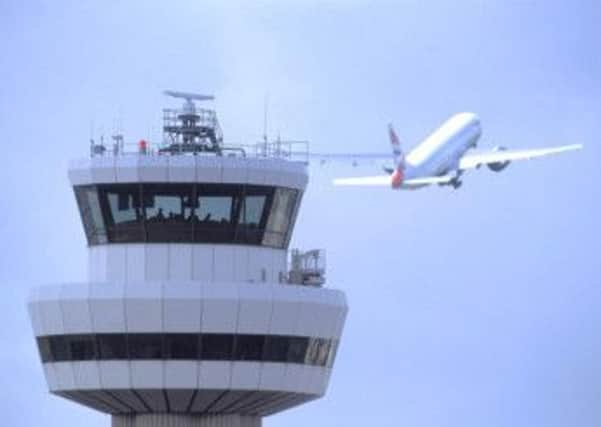It is the best job you could wish for


As an airline pilot, I was based for many years at Gatwick, which can be a frustrating place where chaos sometimes seems to reign.
Passengers usually come there with the sure knowledge they are about to endure a long period of waiting before their flight at last leaves the ground. It’s often an equally frustrating time for their flight crew.
Advertisement
Hide AdAdvertisement
Hide AdI would walk from the car park, through the passenger concourse, making my way to the company offices, and trying to look as if I was not late and in a rush. There, behind the check-in counter, sat a rather serious and worried-looking person in charge of crewing. In front of him was a large document which listed all the company flights for the day, with their crews. It would already be covered in crossings-out and alterations.
Cheerfully: “Morning; Mike Holmes for the 0725 Alicante.”
“Ah yes captain,” he replies. “There are some changes. We want you to operate the 0745 to Faro.”
No real trouble in that, but then he says: “Your aircraft is Whiskey Alpha, and it’s not due in until 0730. It’s running late. Ops will get you a new slot time, but things are busy and we already have delays.”
He also warns of a possible strike by French air traffic control, which will hold up everything. The slot time is the moment you have to turn on to the runway and start your take-off roll. If you are as much as five minutes late, you may have to wait two hours for a new one.
Advertisement
Hide AdAdvertisement
Hide AdYou meet your first officer in flight planning and hope it will be someone you get on with. He has the same thoughts about you. If you don’t get on together, it makes for a difficult day.
Flight planning is quickly completed. All you need comes out of a computer, so you phone your fuel requirements to engineering, who tell you they are busy and there will be a delay getting a bowser. Then you wait for the crew bus to take you to your aircraft. It’s busy too, having just left with crews for aircraft parked miles away. Always your slot time looms in your mind.
There are swarms of people working round the aircraft; engineers, cleaners and such, but the engineer assigned to see you off is waiting to talk to you. He lets you know there is a radio fault and the radio men are working on that. This means they are on the flightdeck so you can’t get there to start the preflight checks.
Then the traffic officer comes up to you in a hurry. It’s his job to look after the passengers and he tells you they are on the way and he wants to board them. Well he can’t, as the aircraft is just not ready for them.
Advertisement
Hide AdAdvertisement
Hide AdThe fuel bowser arrives and the engineer organises the refuelling, but he’s in a hurry too; he has other aircraft to see to.
The slot time looms ever closer. You go up into the cabin and say hello to the number one hostess. She’s probably an old friend, so you chat with her.
She tells you there are a couple of faults in the cabin and asks you to call company on the radio in order to organise a cabin engineer who will fix them. You can’t as the radios are beng worked on. Well, the radios do get fixed; you can call for the cabin engineer and you can start your checks.
The cleaners in the cabin finish their job and things calm down a little.
Advertisement
Hide AdAdvertisement
Hide AdThe engineer enters the fuel in the log, which you then sign.
The fault in the cabin is fixed and the traffic officer again asks if he can board the passengers as they’re waiting in the bus outside.
The number one says the cabin is ready, so you tell him to bring them on.
Then he says that three, who checked in, are lost in the airport. They’ve been called for over the public address, but have not yet arrived at the gate. The slot time looms ever closer.
Advertisement
Hide AdAdvertisement
Hide AdA tug has been ordered to push you back off your park, on to the taxiway. It hasn’t arrived yet, so you call company to ask for it. Standard answer: “It’s on the way.” You can’t leave the lost passengers behind as their baggage is aboard. It’s an old terrorist trick to get a bomb aboard and avoid flying with it.
You call the tower and get your flight clearance.
They tell you things are very busy and there will be long delays if you miss your slot. It’s easy to get a little worried.
You and your first officer try not to show it to one another.
The tug does arrive and hitch up; the lost passengers are found and rushed aboard; you get clearance to start up and taxi out. You join the queue of aircraft at the take-off point; then, on time, it’s your turn to roll.
Advertisement
Hide AdAdvertisement
Hide AdAs you climb away, following the departure route, you begin to relax. The English countryside drops away and the Channel lies below. You reach your assigned level and call for the cruise checks.
I vividly remember that point on a flight to Malaga one bright morning. The Channel Islands were below, Brittany lay ahead and there beyond, the sunlight dappled and shone on the waters of the Bay of Biscay.
The first officer and I looked at one another. We both knew this was the most wonderful job we could ever wish for.